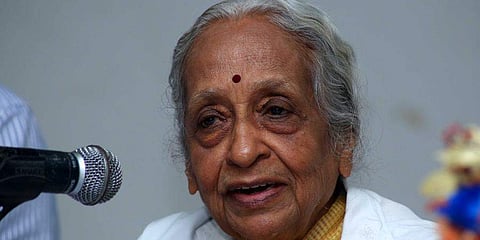

Renowned oncologist and the Chairperson of one of India’s oldest and most prestigious Cancer Institutes in India, Dr V Shanta passed away on January 19 of cardiac complications. The shocking news has left the state, especially the city of Chennai mourning for the doyen, who was one of the most familiar faces in the city and took great measures in her time to make quality cancer treatment available to all sections of society.
Shanta has won some of the most prestigious awards in the country and the world for her work in the field of oncology — the Magsaysay Award, Padma Shri, Padma Bhushan and the Padma Vibhushan. At 93, Shanta was still fully involved in the working of the Adyar Cancer Institute and her loss had left a huge void in the field.
Shanta was born on March 11, 1927, and always wanted to be a doctor. Her greatest inspiration was Dr Muthulakshmi Reddy, the first female medical student at Madras Medical College and the person who set up the Cancer Institute. Even though she got through the Public Services Commission and was posted at the Women and Children Hospital, she quit to join the Cancer Institute. During those days, most women who pursued medicine became gynaecologists and obstetricians, so Shanta’s decision to become an oncologist left many surprised and upset too.
When the Institute was started, it had 12-beds in a cottage with a thatched roof, basic medical equipment and just two doctors, Shanta and her mentor, Dr Krishnamurthi, Reddy’s son. In April, 1955, Shanta was offered a space of residence inside the campus and remained there ever since.
Even though she is known to be one of the greatest minds when it comes to oncology, Shanta was celebrated for coming up with extensive plans and measures to make cancer treatment available to people from all kinds of financial backgrounds, especially in rural areas. The patients are charged based on their status — an income-based differential payment system where people who could not afford at all were also given treatment. Some of her greatest accomplishments includes ensuring duty exemption for cancer drugs, free travel for cancer patients in trains and buses, getting India’s first cobalt machine, the first cancer registry in India and the first screening program for cancer.
As the Institute’s associate director, Shanta set up the country’s first pediatric cancer clinic and was the first to conduct a major cancer survey and developed a program for the early detection of cancer in rural areas. Between 1961 and 1962, the first rural field survey of cancer in India was carried out in Chengelpet district. The Tamil Nadu Cancer Registry Project was the largest cancer registry in the world, covering eight crore population and the first of its kind in the country. “Data from the TNCRP will be a major component in framing cancer policies and cancer control programmes,” the doctor had said.
She worked tremendously to ensure better health care for people in rural areas especially women. She trained hundreds of village health nurses to screen rural women for cervical abnormalities and opened India’s first hereditary cancer clinic in 2000.
The Institute’s services are free or subsidised for about 60 percent of its 100,000 annual patients travel allowances make regular treatments accessible to the poor. It is believed patients would even get picked up, given treatment and dropped off. And through a volunteer program called Sanctuary, the Institute provides hope-giving emotional support and counseling to patients and their families and to cancer-afflicted children.
Shanta also did groundbreaking research on oral, cervical, and breast cancer and pediatric leukemia, publishing the results in international journals and establishing the Institute as India’s first Regional Cancer Research and Treatment Center in 1975. In 1984, the Institute added a postgraduate college where Shanta trained cancer specialists, more than 150 of whom now practice throughout the subcontinent.
So for tens of thousands of patients, cancer survivors and for every Chennaiite who crosses the Adyar Cancer Institute and pondered at its green and peaceful campus, the loss of the doctor is immense and void is here to stay.
